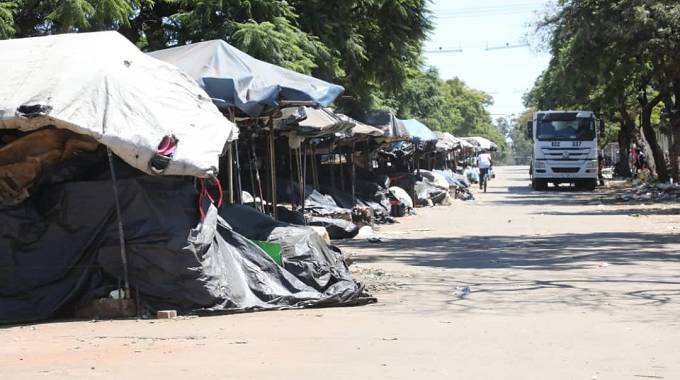Vendors plead for chance to clear perishables

Patrick Chitumba, Midlands Bureau Chief
MRS Miriam Ncube’s vending stall at Kombayi Fresh Produce Market in Gweru was often busy, bringing together up to 10 customers at one go to buy produce that includes tomatoes and potatoes while sharing lively conversations.
This is no longer the case under the ongoing 21-day lockdown aimed at mitigating the spread of the deadly Covid-19 (coronavirus) pandemic.
“The business we have is all about social contact. Customers come to my vending stall bumping against one another, touching and leaving tomatoes, onions and potatoes until they are satisfied with their choice.
“It’s all about social contact, which is different from social distancing. Social distancing is the opposite of what we offered and now we have shut down just like everyone else here,” says Mrs Ncube.
“Now the coronavirus has emptied Kombayi fresh produce market as well as Kudzanai long distance bus terminus market.”
As the lockdown entered its second week yesterday, vendors in Gweru have asked the Government to consider allowing them to clear the fresh produce they have in stock amid indications that they might make losses running into thousands of dollars.
Zimbabwe imposed a nationwide lockdown for 21 days from last week Monday to help curb the spread of the coronavirus. The country has nine confirmed coronavirus cases and one death of broadcaster, Zororo Makamba, so far.
President Mnangagwa said in a recent live broadcast that only state and health workers on duty will be exempted from the lockdown, while funeral gatherings should not involve more than 50 people. The lockdown has also seen security forces being deployed to enforce it.
Mrs Ncube — one of over 4 000 vendors in Gweru’s leading fresh produce markets — Kombayi and Kudzanai — has been home pondering what the future holds after the lockdown. She says she had a large stock of tomatoes, potatoes, onions among other produce when the lockdown was put to effect. Her stock was valued at about $2 000 and she is now afraid these perishable products would go bad before the 21 days are over.
“I’m one of the over 4 000 vendors who deal in fresh produce at Kombayi market and Kudzanai bus terminus. When the lockdown was effected, we had products and you know we deal with perishable products. As each day passes, we are counting our losses,” says Mrs Ncube.
“If only we could be allowed to open say for half a day just like what the leading supermarkets are doing, we could recover our costs.”
For mobile sadza/isitshwala vendor Mr Emmanuel Shoko (37), whose weekly turnover used to be $2 500, the lockdown will mean borrowing more money for meat especially since most of it in his fridge has gone bad because of unavailability of Zesa.
“When we are away like this, no one pays for Zesa and the meat I have is going to be spoiled. But we are soldiering on because it’s better to be alive,” he said.
The usually vibrant city of Gweru is at the moment a pale shadow of itself. Shops from Mkoba, Senga, Southdowns, Mtapa, Southview, Ascot, Mambo suburbs are all closed. In the CBD, the leading supermarkets like OK and PnP are the ones opening half day as well as some pharmacies as residents conform to the lockdown regulations.
Mr Everest Mbenjani, chairperson of Gweru Vendors Association said it was very unfortunate that the lockdown came when they still had stock to sell.
“Our members are crying from their homes. They wish the Government could allow them to sell their produce even for a few hours a day so that we clear what we have in stock. If we don’t clear it, definitely come the end of the 21 days, the stuff we have will have gone bad,” he said.
“We are grateful that the Government has our health and safety at heart as evidenced by this lockdown call but we also need to eat and we get the money for that from the market.”
He said since President Mnangagwa assured the nation that the Government will support businesses, they are hoping that the support will go down to the small to medium enterprises.
Treasury has set aside $600 million to cushion small businesses and vulnerable groups and already an application process is underway to pave way for disbursement to beneficiaries. Governments across the world are offering similar measures aimed at mitigating the economic fallout caused by Covid-19.












Comments